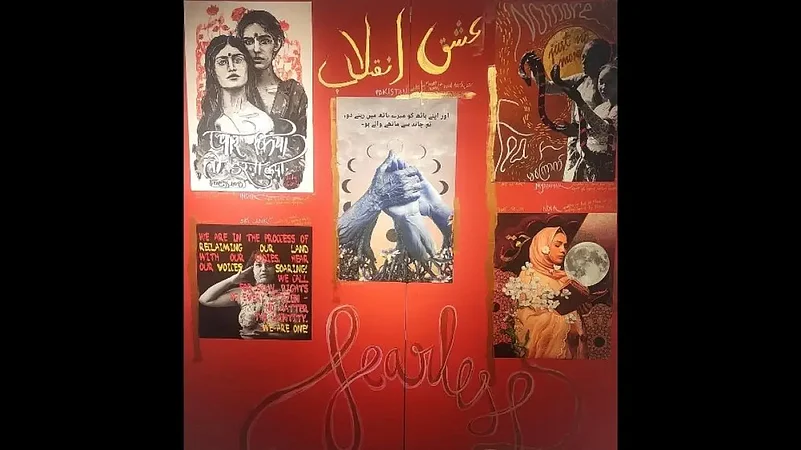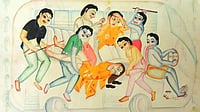The newest big name to create NFTs (Non-Fungible Tokens) is Shilo Shiv Suleman, a Bengaluru-based artist and founder-director of the public art project, Fearless Collective. At the Disruptors Techne show, an India Art Fair parallel event curated by Myna Mukherjee on April 30 at India Habitat Centre in New Delhi, the collective did an NFT drop of five Fearless posters by artists from India, Pakistan, Myanmar and Sri Lanka, to vocalise revolutions in their respective nations.
From the five NFTs, one poster is on the collective's Haq movement, where, to counter the Bulli Bai app and hijab ban, Muslim women were asked to send in their portraits that artists made into beautiful illustrations to celebrate diversity. Another poster responds to the military coup in Myanmar. Proceeds from the NFTs, priced at USD 1,500 each, will go towards funding the collective's work.
Suleman, who was present while displaying another work—a holographic, digital series of Kamasutra sculptures to counter masculine notions of sex with a female voice—says she had no qualms about creating NFTs after extensively using technology in her art installations. "It felt like a natural progression of something waiting to happen for a long time, as artists are increasingly turning to online media, be it animation or Photoshop." However, the prime reason why NFTs appeal to her is that the medium feels more dynamic than the "Indian art scene that has become very static". Suleman says, "In the NFT universe, it is more about the artist and less about what is sellable or what collectors want and think worthy of an investment. But in the Indian art world, things are stuck. While walking around this edition of the India Art Fair, I found many works looking very similar to each other. I didn't see the spirit, the politics, or the personalities of the artists in the Indian contemporary art scene."

It is why Suleman began the Fearless Collective, "an intentional intervention of art into protest movements" to highlight public resistance, lived histories, and stories about people who are not empowered. "What we found as we moved from the frontline of Shaheen Bagh to the front line of the ongoing protests in Sri Lanka, is that art is not contained in an art gallery, it is not separate from our life. Our Independence movement is founded on the poetry of Rabindranath Tagore. The Salt March by the Mahatma, in a way, was also performance art. But the art world makes you feel art is only present in the gallery, not on the streets, and is not something you'd lookup on your computer or phone. It wants art to be very pristine, boxed/caged in." The art-tech proponent, however, is grateful for the staunch gallery support from the Mumbai-based Art Musings. She's showing at their booth this year as well, but the last physical edition was more memorable. "At the previous fair, I was painting a mural at Shaheen Bagh, and remember coming to the gallery booth covered in paint, khaki boots, with tiranga flags on my cheeks. But Art Musings was incredibly supportive of my political art."
It's not just the decision-makers of the art world who install limitations on the freedom of expression, but political work is difficult to find space even on the streets. "This particular series of Kamasutra sculptures came about when over the last year I became acutely aware that I had a Muslim last name. A lot of my inspiration comes from Hinduism, I am a practising Hindu. This entire series of sculptures is inspired by Hindu temples, and yet having a Muslim last name it felt that if I had to put these out publicly it would end up, in a really bad place. This is why it felt important to participate in the NFT movement and look at what roles sensuality and sex can play in this new space."
About the scepticism around NFTs, Suleman says people always find new technology scary. "The tawaifs in Lucknow were the first women who allowed themselves to be photographed but all the other women were so scared of the camera when it first came to India. It is why you find these amazing pictures of tawaifs because they were fearless and transgressed their boundaries. Today, everyone has become so comfortable with photography."
Despite raving about the new medium, Suleman cautions about falling back into old ways. "We must not replicate the same issues that exist in the traditional art space. The biggest issue concerns the curators, gallerists, and institutions in the art world who have become 'gatekeepers' of what can or cannot be sold, and take away the democracy of that platform. This notion that NFTs offer a democratic space is great only if you work independently, and not with institutions because that would mean going back to the same trope."


























